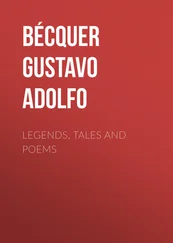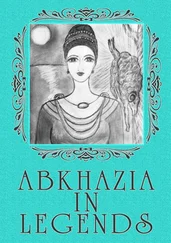Gustavo Bécquer - Romantic legends of Spain
Здесь есть возможность читать онлайн «Gustavo Bécquer - Romantic legends of Spain» — ознакомительный отрывок электронной книги совершенно бесплатно, а после прочтения отрывка купить полную версию. В некоторых случаях можно слушать аудио, скачать через торрент в формате fb2 и присутствует краткое содержание. Жанр: foreign_antique, foreign_prose, на английском языке. Описание произведения, (предисловие) а так же отзывы посетителей доступны на портале библиотеки ЛибКат.
- Название:Romantic legends of Spain
- Автор:
- Жанр:
- Год:неизвестен
- ISBN:нет данных
- Рейтинг книги:4 / 5. Голосов: 1
-
Избранное:Добавить в избранное
- Отзывы:
-
Ваша оценка:
- 80
- 1
- 2
- 3
- 4
- 5
Romantic legends of Spain: краткое содержание, описание и аннотация
Предлагаем к чтению аннотацию, описание, краткое содержание или предисловие (зависит от того, что написал сам автор книги «Romantic legends of Spain»). Если вы не нашли необходимую информацию о книге — напишите в комментариях, мы постараемся отыскать её.
Romantic legends of Spain — читать онлайн ознакомительный отрывок
Ниже представлен текст книги, разбитый по страницам. Система сохранения места последней прочитанной страницы, позволяет с удобством читать онлайн бесплатно книгу «Romantic legends of Spain», без необходимости каждый раз заново искать на чём Вы остановились. Поставьте закладку, и сможете в любой момент перейти на страницу, на которой закончили чтение.
Интервал:
Закладка:
“In this house lives the right honorable Señor don Alonso de Valdecuellos, Master of the Horse to our lord, the King. He has been wounded in the war with the Moors and is now in this city recovering from his injuries.”
“Well! well! His daughter?” broke in the impatient youth. “His daughter, or his sister, or his wife, or whoever she may be?”
“He has no woman in his family.”
“No woman! Then who sleeps in that chamber there, where all night long I have seen a light burning?”
“There? There sleeps my lord Don Alonso, who, as he is ill, keeps his lamp burning till dawn.”
A thunderbolt, suddenly falling at his feet, would not have given Manrico a greater shock than these words.
“I must find her, I must find her; and if I find her, I am almost certain I shall recognize her. How? – I cannot tell – but recognize her I must. The echo of her footstep, or a single word of hers which I may hear again; the hem of her robe, only the hem which I may see again would be enough to make me sure of her. Night and day I see floating before my eyes those folds of a fabric diaphanous and whiter than snow, night and day there is sounding here within, within my head, the soft rustle of her raiment, the vague murmur of her unintelligible words. – What said she? – What said she? Ah, if I might only know what she said, perchance – but yet without knowing it, I shall find her – I shall find her – my heart tells me so, and my heart deceives me never. – It is true that I have unavailingly traversed all the streets of Soria, that I have passed nights upon nights in the open air, a corner-post; that I have spent more than twenty golden coins in persuading duennas and servants to gossip; that I gave holy water in St. Nicholas to an old crone muffled up so artfully in her woollen mantle that she seemed to me a goddess; and on coming out, after matins, from the collegiate church, in the dusk before the dawn, I followed like a fool the litter of the archdeacon, believing that the hem of his vestment was that of the robe of my unknown lady – but it matters not – I must find her, and the rapture of possessing her will assuredly surpass the labors of the quest.
“What will her eyes be? They should be azure, azure and liquid as the sky of night. How I delight in eyes of that color! They are so expressive, so dreamy, so – yes, – no doubt of it; azure her eyes should be, azure they are, assuredly; – and her tresses black, jet black and so long that they wave upon the air – it seems to me I saw them waving that night, like her robe, and they were black – I do not deceive myself, no; they were black.
“And how well azure eyes, very large and slumbrous, and loose tresses, waving and dark, become a tall woman – for – she is tall, tall and slender, like those angels above the portals of our basilicas, angels whose oval faces the shadows of their granite canopies veil in mystic twilight.
“Her voice! – her voice I have heard – her voice is soft as the breathing of the wind in the leaves of the poplars, and her walk measured and stately like the cadences of a musical instrument.
“And this woman, who is lovely as the loveliest of my youthful dreams, who thinks as I think, who enjoys what I enjoy, who hates what I hate, who is a twin spirit of my spirit, who is the complement of my being, must she not feel moved on meeting me? Must she not love me as I shall love her, as I love her already, with all the strength of my life, with every faculty of my soul?
“Back, back to the place where I saw her for the first and only time that I have seen her. Who knows but that, capricious as myself, a lover of solitude and mystery like all dreamy souls, she may take pleasure in wandering among the ruins in the silence of the night?”
Two months had passed since the servitor of Don Alonso de Valdecuellos had disillusionized the infatuated Manrico, two months in every hour of which he had built a castle in the air only for reality to shatter with a breath; two months during which he had sought in vain that unknown woman for whom an absurd love had been growing in his soul, thanks to his still more absurd imaginations; two months had flown since his first adventure when now, after crossing, absorbed in these ideas, the bridge which leads to the convent of the Templars, the enamored youth plunged again into the intricate pathways of the gardens.
The night was calm and beautiful, the full moon shone high in the heavens, and the wind sighed with the sweetest of murmurs among the leaves of the trees.
Manrico arrived at the cloister, swept his glance over the enclosed green and peered through the massive arches of the arcades. It was deserted.
He went forth, turned his steps toward the dim avenue that leads to the Douro, and had not yet entered it when there escaped from his lips a cry of joy.
He had seen floating for an instant, and then disappearing, the hem of the white robe, of the white robe of the woman of his dreams, of the woman whom now he loved like a madman.
He runs, he runs in his pursuit, he reaches the spot where he had seen her vanish; but there he stops, fixes his terrified eyes upon the ground, remains a moment motionless, a slight nervous tremor agitates his limbs, a tremor which increases, which increases, and shows symptoms of an actual convulsion – and he breaks out at last into a peal of laughter, laughter loud, strident, horrible.
That white object, light, floating, had again shone before his eyes, it had even glittered at his feet for an instant, only for an instant.
It was a moonbeam, a moonbeam which pierced from time to time the green vaulted roof of trees when the wind moved their boughs.
Several years had passed. Manrico, crouched on a settle by the deep Gothic chimney of his castle, almost motionless and with a vague, uneasy gaze like that of an idiot, would scarcely take notice either of the endearments of his mother or of the attentions of his servants.
“You are young, you are comely,” she would say to him, “why do you languish in solitude? Why do you not seek a woman whom you may love, and whose love may make you happy?”
“Love! Love is a ray of moonshine,” murmured the youth.
“Why do you not throw off this lethargy?” one of his squires would ask. “Arm yourself in iron from head to foot, bid us unfurl to the winds your illustrious banner, and let us march to the war. In war is glory.”
“Glory! – Glory is a ray of moonshine.”
“Would you like to have me recite you a ballad, the latest that Sir Arnaldo, the Provençal troubadour, has composed?”
“No! no!” exclaimed the youth, straightening himself angrily on his seat, “I want nothing – that is – yes, I want – I want you should leave me alone. Ballads – women – glory – happiness – lies are they all – vain fantasies which we shape in our imagination and clothe according to our whim, and we love them and run after them – for what? for what? To find a ray of moonshine.”
Manrico was mad; at least, all the world thought so. For myself, on the contrary, I think what he had done was to regain his senses.
THE DEVIL’S CROSS
Whether you believe it or not matters little. My grandfather told it to my father; my father related it to me, and I now recount it to you, although it may serve for nothing more than to pass an idle hour.
Twilight was beginning to spread its soft, dim wings over the picturesque banks of the Segre, when after a fatiguing day’s travel we reached Bellver, the end of our journey.
Bellver is a small town situated on the slope of a hill, beyond which may be seen, rising like the steps of a colossal granite amphitheatre, the lofty, enclouded crests of the Pyrenees.
Читать дальшеИнтервал:
Закладка:
Похожие книги на «Romantic legends of Spain»
Представляем Вашему вниманию похожие книги на «Romantic legends of Spain» списком для выбора. Мы отобрали схожую по названию и смыслу литературу в надежде предоставить читателям больше вариантов отыскать новые, интересные, ещё непрочитанные произведения.
Обсуждение, отзывы о книге «Romantic legends of Spain» и просто собственные мнения читателей. Оставьте ваши комментарии, напишите, что Вы думаете о произведении, его смысле или главных героях. Укажите что конкретно понравилось, а что нет, и почему Вы так считаете.












